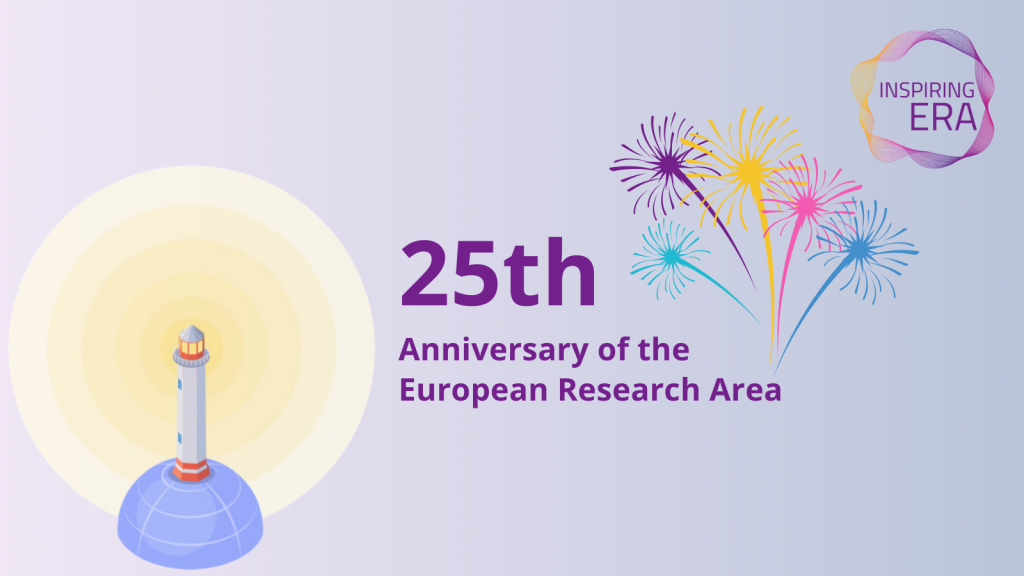Imagine a Europe where scientists, researchers, and innovators move freely, where groundbreaking ideas transcend national borders, and where research funding is readily accessible to the brightest minds. This vision began to take shape with the launch of the European Research Area (ERA) in 2000.
ERA was founded on a simple yet ambitious goal: to create a single market for research, innovation, and knowledge, transforming Europe into a global leader in scientific progress. Over the past 25 years, the ERA has broken down barriers, enhanced collaboration, and strengthened Europe’s competitiveness in science and technology. It has played a crucial role in enabling scientific breakthroughs in fields such as health, energy, digital technologies, and climate research. While challenges remain, the ERA’s achievements stand as a testament to Europe’s commitment to research and innovation.
25 Years of the ERA: A legacy of success
The past 25 years have been marked by significant progress. European researchers have benefited from world-class funding programmes like the Framework Programmes (FP6, FP7, Horizon 2020, and Horizon Europe), which have facilitated cross-border collaboration and knowledge exchange. A wide range of success stories bears witness to the achievements of the ERA. The establishment of the European Research Council (ERC) in 2007 has provided substantial grants for pioneering research, supporting scientific excellence across disciplines.
Europe has also emerged as a leader in open science and international cooperation. The Open Science movement, supported by the ERA, has fostered greater accessibility to research, enabling innovation to thrive. Initiatives such as the European Open Science Cloud (EOSC) have improved data sharing and collaboration among researchers. The ERA’s emphasis on inclusivity has led to increased participation of women in science and more balanced research opportunities across member states.
In health research, European scientists have played a key role in combating global challenges, including the rapid response to COVID-19. Programmes such as the Innovative Health Initiative (IHI) have fostered partnerships between academia and industry, leading to advancements in treatments and medical technologies. Similarly, European research in renewable energy and climate science has been instrumental in shaping global sustainability policies and driving green innovation.
The ERA has also been vital in strengthening Europe’s research infrastructure. Investments in large-scale facilities, such as the European Spallation Source (ESS) and the European Space Agency’s (ESA) missions, have positioned Europe at the forefront of scientific exploration and technological advancement. Additionally, the Pact for Research and Innovation (R&I), introduced in 2021, has provided a renewed commitment to aligning national and EU research policies. The first ERA Policy Agenda (2022-2024) has laid the foundation for translating strategic priorities into concrete outcomes, ensuring that Europe continues to evolve as a leader in scientific excellence.
Recognising the importance of attracting and retaining top talent, the ERA has also introduced policies to improve research careers. The ERA Talent Platform has been launched to provide better career support, facilitate mobility, and enhance working conditions for researchers across Europe. Efforts to reform research assessment through the Coalition for Advancing Research Assessment (CoARA) aim to create fairer evaluation systems that value a broad range of scientific contributions. Furthermore, the European Framework for Research Careers seeks to establish clearer career paths and reduce precarious employment in academia. These measures ensure that Europe remains an attractive destination for researchers and innovators, reinforcing its position as a global leader in scientific excellence.
The future of the ERA: strengthening success and unlocking potential
Despite its achievements, the ERA still faces challenges. Europe continues to lag behind global competitors such as the US and China in turning research into market-ready innovations. Fragmentation in research funding, bureaucratic hurdles, and disparities in national research investments have slowed progress. While the EU has set a target for member states to invest at least 3% of GDP in R&D, the current average remains lower, highlighting the need for greater financial commitment.
Recognising these challenges, experts such as Enrico Letta, Mario Draghi, and Manuel Heitor have proposed significant reforms to strengthen Europe’s research and innovation landscape. Letta advocates for establishing a “fifth freedom” within the single market, ensuring the free movement of knowledge, research, and education. Draghi emphasises the need to substantially increase funding for innovation and create a dedicated ‘Research and Innovation Union’ to streamline efforts. Heitor, meanwhile, has proposed doubling the budget for the next framework programme (FP10) to €220 billion, alongside initiatives like “Choose Europe,” designed to attract and retain young researchers and prevent brain drain. As highlighted during the ERA Conference “Fostering Greater Integration. Advancing Competitiveness” in September 2024, greater alignment between national and European R&I strategies is essential to strengthening the ERA.
One of the key priorities for the coming years is the continued implementation of the ERA Policy Agenda. The forthcoming 2025-2027 policy cycle will focus on accelerating research collaboration, improving access to funding, and fostering stronger links between academia and industry. The development of an ERA Act could provide the legal foundation necessary to solidify research and innovation as a pillar of the EU single market. Moreover, simplifying funding procedures and increasing the flexibility of grant mechanisms—through approaches like Heitor’s “trust first, evaluate later” model—could enable faster and more effective innovation.
Over the past quarter-century, the ERA has transformed the European research landscape, fostering collaboration, excellence, and innovation. By aligning national and EU policies, strengthening research infrastructures, and championing open science, the ERA is poised for an even brighter future. With bold reforms, increased investment, and a commitment to scientific excellence, Europe is well-positioned to lead the next era of global innovation.
Learn more:
More information on ERA-related policies, developments, priorities, reports and events on the ERA Policy Platform
Exhibition of ERA Success Stories
Showcase of ERA-related initiatives
General information on the European Commission’s website
ERA infographics
Factsheet on the history of ERA


